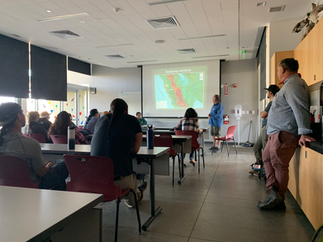Stewardship Pathways Program Hosts First Native Plant Propagation Trainings
- Apr 19, 2022
- 2 min read
Updated: Oct 21, 2022
The first native plant propagation trainings took place last month at the Jamul Indian Village and surrounding areas. Trainees had two days to connect with each other, the landscape, climate change scientists, Indigenous elders from both sides of the border, and to learn technical skills around plant collection and propagation.

Over the past year, the Climate Science Alliance has been working hard at developing our Stewardship Pathways Programs. Part of our larger Resilient Restoration project, the Stewardship Pathways Program invites Indigenous peoples from across Southern California who are interested in building or expanding a career focused on native plant restoration or wildland firefighting and monitoring.
This year, the native plant propagation pathway consists of various training sessions focusing on different propagation techniques in a regional, climate, and cultural context. Twenty-five trainees from across Southern California come together to obtain this hands-on learning.
The first of these five trainings took place last month at Jamul Indian Village and surrounding areas. 25 trainees had two days to connect with each other, the landscape, climate change scientists from San Diego State University and the University of California at Riverside to discuss climate impacts to the region, Indigenous elders and knowledge holders from both sides of the border to learn about ethnobotanical uses of native plants, and to learn technical skills around plant collection and propagation.
We thank all of the participants of the training for their time and active engagement throughout the weekend. We would also like to thank the leadership and community of Jamul Indian Village for hosting this training on their lands, as well as our partners at Wild Willow Farms and the USFWS San Diego Refuge for providing space to learn together.
Special thanks to our funders for making this work possible: California Strategic Growth Council and San Diego Gas and Electric.


































